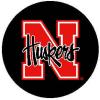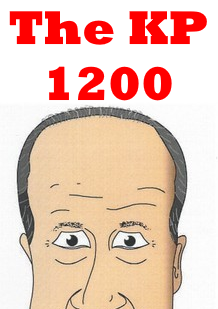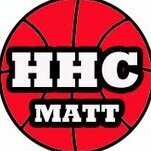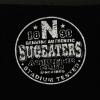Then & Now: Chuck Jura
Compiled By Dave Brandon
(Photo Courtesy NU Media Relations)
Basketball Hall of Famer Chuck Jura played for the
Huskers from 1970-1972, and is fourteenth in all-time
scoring at Nebraska (1,255 points). The 6'10" Jura also
ranks in the top ten in career scoring average, field
goal percentage, rebounds, and rebound average. And,
besides being All-Big 8 on the court, Jura also excelled
in the classroom while at Nebraska, where he enjoyed
All-Big 8 accolades.
Jura was
a third-round draft pick of the Chicago Bulls, and
recently joined HHC for our latest Sunday version of
"Then & Now."
HHC: Chuck,
thanks a lot for taking a trip down memory lane with
us.
CJ: Not a
problem, glad to talk with you.
HHC: Before arriving at NU, you starred in
basketball at Schuyler, Nebraska. Do you feel that
playing at that small of a level prepared you well for
the Big 8, or did most of your growing occur at
Nebraska?
CJ: I would say that to a certain extent, high
school prepared me well, because at that time, there
were some good players in the state. Tom Kropp, Dwayne
Dillard and Bob Gratopp out of Omaha Central, and Sam
Martin in Pawnee City were just a few of the good
players at that time who went on to play Division One
ball. But today, it’s a completely different game.
Players are just so much bigger, stronger, and more
athletic, so maybe today it wouldn’t have prepared me as
well.
HHC: Who else recruited you besides
Nebraska, and was there ever any doubt where you'd end
up?
CJ: It came down to Nebraska, Missouri,
LSU, Washington, and Seattle University. I really liked
the Pacific Northwest, but in the end, it came down to
Nebraska.
In those
days, they actually had you signed as far as the
conferences were intended. I was down to Missouri and
Nebraska after I signed my Big 8 letter of intent, and
then signed with Nebraska.
I always
really liked Norm Stewart, and we still talk. Both of my
brother’s live in Missouri, actually. But yeah, Joe
Cipriano and I got along really well, and that was the
man reason I came to Nebraska.
HHC: Since most of our readers have no
recollection of Joe Cipriano, describe him in your own
words, both as a coach and a person.
CJ: Joe
Cipriano was one of a kind. He was probably not the
greatest X’s and O’s man, but he was a very good
recruiter and very personable as a coach. He was someone
who cared about you as a person, and I think that’s one
of the things that led to my success. I almost owe my
success to the fact that he was patient with a 6’10”
white kid out of Schuyler, Nebraska.
HHC: How did he earn the nickname
"Slippery Joe?"
CJ: He was a character, man. He used to do all
kinds of stuff. There was a game one time, and in those
days they had, believe it or not, at the end of the
game, a starter pistol on the scorers table to announce
the commencement. But I can remember Joe, and your not
going to believe this, but he went over to the referees
and was mad one time, and fired the pistol to get their
attention during the game. That happened in ’68 or ’70.
Joe was
a tremendous basketball player, too. He was a very quick
point-guard and played at Idaho, I believe, or somewhere
in the northwest. I think that’s where the name comes
from. I remember that he and the coaches used to take
their suits off some days and come out and play against
us, and it seemed like they never played besides that,
but they’d come out and pass it around and shoot. He was
just a character.
HHC: We always
talk about Danny Nee being colorful, but he sounds
pretty colorful in his own right, huh?
CJ: Definitely. Another thing Cipriano did was
one time at KU, playing in front of a sold out crowd,
(laughs) he slipped vampire teeth in his mouth, and the
students were on him, and he turned around and acted
like a vampire, and they went nuts on him. (Laughs) They
absolutely loved him everywhere he went. Just a
character, that’s all I can say.
HHC: (Laughs) How would you describe Chuck
Jura, both as an individual player and a teammate?
CJ: To be perfectly honest, when we were
at Nebraska, I wasn’t very good, and we really didn’t
come to our potential. We had some tremendous players,
like Al Nissen, who is now a doctor, and was the last
cut with the KC Kings in 1972. Nissen was actually a
walk-on at Nebraska before that. Then, there was Leroy
Chalk and Marvin Stewart, but we just never put it
together as a team, and for that, I feel very
unfortunate.
I became
a much better player after Nebraska when I got to Italy,
because it was a business then and I knew what I had to
do. I had a coach who put it in straight terms, and told
me either you performed, or you went home. I spent a lot
of time shooting hook shots at Nebraska, to answer what
kind of a player I was there, and when I got to Europe,
I turned around and faced up a lot more. That is what I
should have done while I was at Nebraska, but I didn’t,
and instead shot hooks even though I couldn’t make one
to save my life.
HHC: In your first season of 1969-1970,
you guys went 16-9, and finished third in the Big 8.
Talk to us about some of your teammates, and describe
them as players, as most people just know them from a
name in the media guide.
CJ: Marvin Stewart got drafted in the 2nd
round by the 76ers and signed a contract, and would have
been playing for a long time because he was a tremendous
pure shooter, but he tore his knee up in training camp.
Bob Gratopp was another great shooter, and went on to be
a referee, although he’s since passed away,
unfortunately. Another guy who passed away was Kenny
Cauble, who played two years with us and later became a
police officer. He was a long jumper and high jumper in
addition to playing basketball. I think he high jumped
6’8 or 6’9. We had a ton of individuals that had talent,
but we just never put it together.
HHC: 1970-1971 saw Nebraska go 18-8, yet
no post-season. How difficult was it to make the
post-season back then, and were you guys close that
year?
CJ: If it were like it was today, we’d
have made the dance, that wasn’t the problem. In those
days, the first place team in the Big 8 went to the
NCAA’s, the second place went to the NIT. Two teams
went, and that was it. That was just the way it was, and
of course they expanded it later for the revenues and
money, but in those days, if you check back and look at
our senior year, we went 3-0 in the Big 8 and we went to
KU and played against Bud Stallworth. There were 5
seconds left on the clock, and we had a 65-65 ballgame.
Our ball, out of bounds, Stallworth is fouled out on the
bench, and we’re taking the ball out of bounds. However,
we didn’t get the ball in bounds, as a Kansas player
stole the ball, went the other way, and layed it in. We
had their best player on the bench, waiting for
overtime, and we lost it. That put us at 3-1, and then
the next week, Oklahoma came into Lincoln and took us
out. After that, it was really over.
HHC: Besides the post-season, talk about
some other differences in the college game from back
when you played?
CJ: Well there’s the dress, of course. We
had the short shorts and everybody wore one or two
brands of tennis shoes. There was Converse, but no Nike.
Also, when I started as a freshman, I couldn’t play in
post-season, even though I played in 10 games. But, they
didn’t count the stats.
Back then, Bill Harrell was my freshman coach, and after
Nebraska, he went onto Moorehead State. He actually
wrote two books on defense, and is the only man in the
history of college basketball to win a high school
championship in both the state of Indiana and Kentucky.
However, he was fishing a year ago, fell out of the boat
after a heart attack, and drowned.
Here’s another difference for, you couldn’t dunk back
then.
HHC: That stinks for a 6’10” guy, huh?
CJ: That’s for sure.
HHC: (Laughs) Talk
about what it was like playing in the Coliseum.
CJ: It was unbelievable man. There were
sparrows dive-bombing you when you’d lay it up in
warm-ups.
HHC: What?!?
CJ: Yes, I promise you. The place was
always packed, sold out, and the fans were just amazing.
We had bleachers on the sides, and it ran straight up,
and the fans were just right on people. The place was
electric.
There was a memorable vendor that would sell ice cream
bars, and people would throw him down a quarter, and
he’d shoot the ice cream bar up. And he never missed, I
swear. We’d sit around in the huddle with Cip, and watch
this guy THROW it way up. It was amazing.
HHC: Your last year at Nebraska was
1971-1972, and you earned All-Big 8 honors. However, the
team finished just 14-12. Talk about what you remember
from your senior season at Nebraska, and was it the most
special one you had?
CJ: No, it wasn’t, because everybody will tell
you that we had tremendous talent, but we just didn’t
put it together as a team. Our last year, we played some
tough teams, like Iowa against “Downtown” Freddy Brown,
who lit us up for 36 with no 3-point line. The guys we
had, our starting guard Al Nissen, who had been a
walk-on, was the last player cut by the Kings. They kept
Mike D’Antoni, who is now the coach of the Phoenix Suns.
My freshman year, Jim White, the golfer from Nebraska,
he was on the team. He was a starting guard, before he
transferred to Hastings.
HHC: So you
underachieved. Does this fall on Joe Cipriano’s
shoulders?
CJ: No, I think the team cohesiveness was the
problem. You have to understand, this was the 1960’s and
1970’s when we had lots of individualism. The African
American players were just coming into their own, as far
as being able to express themselves. It was an
interesting time to go to school.
HHC: After you
graduated, you were drafted by the Chicago Bulls in the
3rd round of the NBA draft. Talk about the excitement of
being drafted, and what happened with the NBA?
CJ: It was real exciting, except the fact the
Chicago Bulls had a full roster of no cut players. Bob
Love, Chet Walker, etc. So, getting drafted in the 3rd
round meant small bonus, get cut, go to CBA. I wasn’t
going to do that, so my agent introduced me to some
people from Italy, and I signed there in 1972 and stayed
for two years. Then, I fired my agent, and took
everything over myself, and I played the next twelve
years in Italy by myself. I played against Spencer
Haywood, John Brown from the Bulls, Bob McAdoo, and Mike
D’Antoni.
HHC: And what
has Chuck Jura been up to the last thirty years, and
where is he at today, both personally and
professionally?
CJ: I’m retired, and living in Columbus,
Nebraska. I have a son who plays at UNK, and he’s a
junior, so I follow him at UNK. That’s about it.
After
basketball, I had a situation involving investments,
where I owned some investments like a few Pizza Hut’s,
motels, and stuff, but I sold those and am now retired.
I still
play basketball, actually. We just won the world
championships for players 55 and over in Canada this
July.
HHC: Really?
CJ: Yes. And four years ago, I went to
Melbourne, Australia, where we won the world
championships for 50 and over. I play with a team out of
Chicago.
HHC: We hope
we are still that active at your age.
CJ: You calling me old?
HHC: (Laughs) Of course not. Chuck, thanks
a lot for taking the time to join us, and will you be
willing to take e-mails from the readers at
chuck@huskerhoopscentral.com if we set it up and
tell you how to check it?
CJ: Yeah, I don’t have a problem with
that; I’d love to hear from some fans. And thank you for
calling.<script type="text/javascript" language="javascript">






Recommended Comments
There are no comments to display.
Join the conversation
You can post now and register later. If you have an account, sign in now to post with your account.